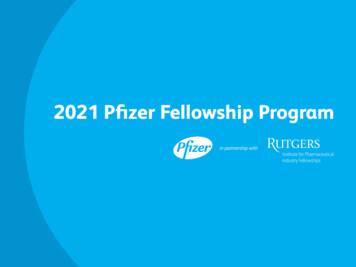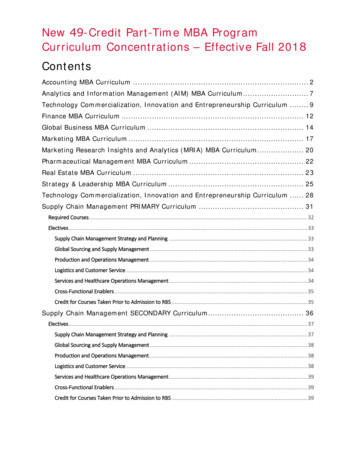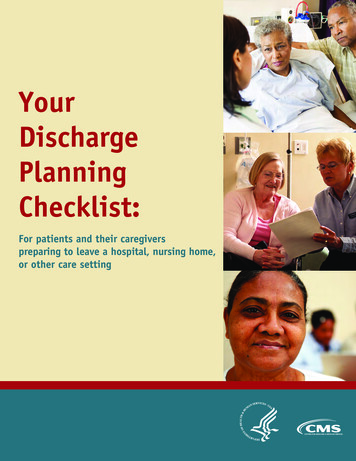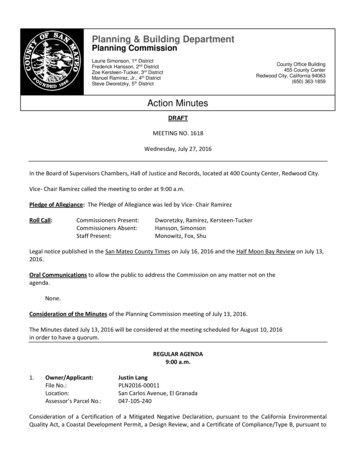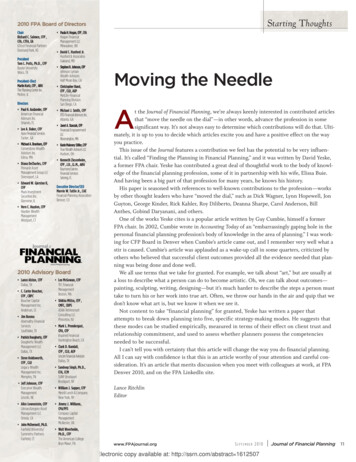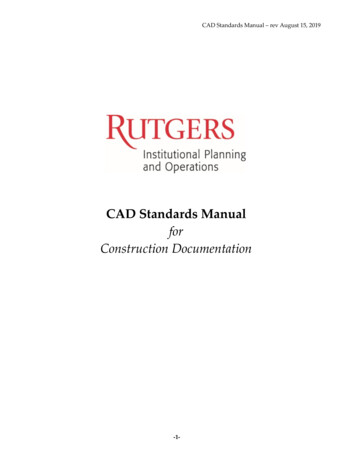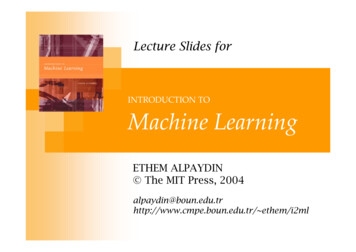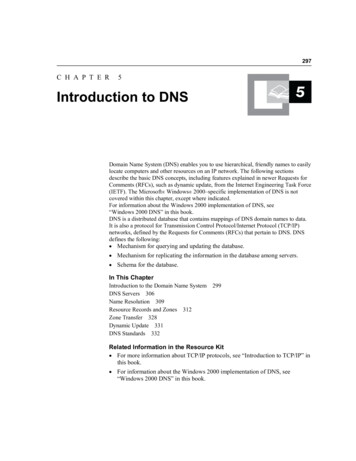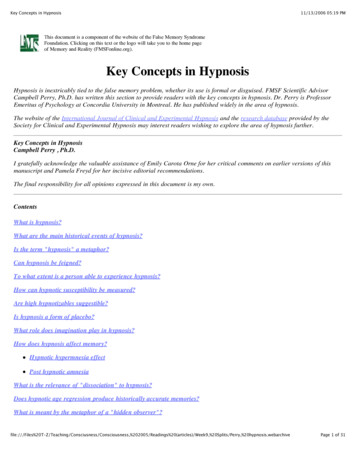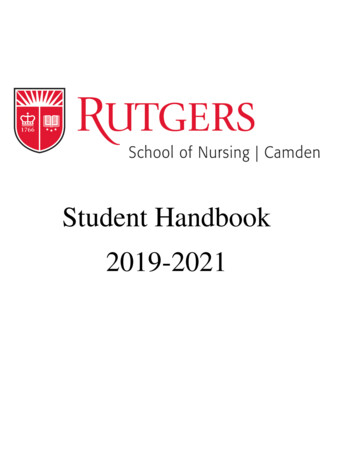
Transcription
Graduate Program inUrban Planning & Policy Developmentbloustein.rutgers.edu
A Rutgers University team, led byBloustein School students ChelseaMoore-Ritchie (MCRP), Christine Winter(MCRP), Jane Allen (MCRP-MPP),Sharone Small (MCRP), and KimberlyTryba (Landscape Architecture), andBloustein School Professor TonyNelessen, won the 2017 HUD Innovationin Affordable Housing Competition.The students were challenged withredesigning an existing public housingdevelopment in Cleveland, Ohio, toconnect residents with each other andtheir neighborhoodThe mission of the Urban Planningand Policy Development program isto advance planning—defined as theapplication of foresight to action—througheducation, research, and public service.It provides students with the conceptualfoundation and technical skills to engagecollaboratively with affected individualsand groups, using planning to increaseopportunity and reduce social inequality.The program is committed to givingstudents an innovative, distinctive, andcomprehensive planning education at thehighest standard of scholarly excellence,and instilling a passion for public service.The program is policy-oriented with sixconcentrations: transportation policy andplanning; development/redevelopment;environmental, human health and landuse planning; community development andhousing; international development; andurban informatics.THE BLOUSTEIN SCHOOLThe Edward J. Bloustein School of Planning and Public Policy at Rutgers,The State University of New Jersey seeks to improve our increasinglyurbanized and interconnected world by exploring planning approachesand public policy solutions that are healthier, greener, fairer, and generategreater prosperity than do current practices. It pursues equitable andefficient solutions to public problems at multiple levels from the global tothe local and emphasizes the professional perspectives of urban planning,public policy, public informatics, and public health. Within each ofthese domains, the school advances its aspiration to be a global leaderin teaching, research, and service by engaging society’s challenges withfocused programs that align current strengths with emerging needs.The Program in Urban Planning and Policy Development at the BlousteinSchool is ranked among the top five planning programs in the country.Faculty in the program are nationally and internationally renownedscholars who are actively involved in shaping the fields of transportation,development/redevelopment, environment, community development andhousing, international planning, health policy, workforce developmentand social policy. The faculty’s cutting edge research and policy work areaugmented by the numerous research centers within the school, providinga rich, vibrant learning environment.
THE PROGRAM IN URBAN PLAFounded in 1967, the Urban Planning and Policy Development (UPPD) Program educates innovative people who wish to combinesocial concerns with analytic skills. While planners work on a wide range of problems, they also are likely to focus on a particular issueor specialization in building individual careers, concentrating their professional expertise. For this reason the trained planner is oftencalled “a generalist with a specialty.” That phrase is more than just a cliché. It suggests that a useful curriculum will contain a productiveapplication of faculty disciplines and other program resources. It defines the approach to graduate study in urban planning and policydevelopment at Rutgers University.Planning is future-oriented and comprehensive. It seeks to link knowledge and actionin ways that improve the quality of public and private development decisions affectingpeople and places. Because of its future orientation, planning embraces visionaryand utopian thinking, yet also recognizes that the implementation of plans requiresthe reconciliation of future states to present realities. To become effective and ethicalpractitioners, students must develop a comprehensive understanding of cities andregions, and of the theory and practice of planning. They must also be able to use avariety of analytic methods in their practice. They must become sensitive to the waysin which planning affects individual and community values, and must be aware of theirown roles in this process.MASTER OF CITY AND REGIONAL PLANNING(MCRP)The Master of City and Regional Planning (MCRP) degree is recognized as the mostcommon professional degree in the field. This program prepares students for practicein planning as well as policy and program development through a curriculum designedto develop an understanding of the linkages between the social, economic, and politicalfactors of urban society and the physical and environmental framework of regions andcommunities.The program requires two years of full-time coursework, a total of 48 credits overfour semesters. Some employed students complete the program with part-time study.Reflecting the school’s philosophy of providing an interdisciplinary and custom approachfor each student, 24 elective credits are included in the 48-credit total. Students mustmaintain an overall grade-point average of 3.0 in order to graduate.Students also participate in two, 3-credit Graduate Planning Studios, providing studentswith practical experience in a specific area of planning while working as a team memberwith a client on a real planning problem.MCRP Required Course of Study(48 credits)nnnnnnnnHistory and Theory of Planning(3 credits)Urban Economy and SpatialPatterns (3 credits)Graduate Planning Studios(6 credits)Basic Quantitative Methods(3 credits)Planning Methods (3 credits)An additional methods course(3 credits), chosen from anextensive list of qualitative andquantitative courses approved bythe program directorSurvey of Planning Law Principles(3 credits)24 credits of elective courses,which includes 4-5 courses inan area of concentration(12-15 credits)
ANNING AND POLICY DEVELOPMCRS Required Course of Study(30 credits)nnnnnHistory and Theory of Planning(3 credits)Urban Economy and SpatialPatterns (3 credits)Basic Quantitative Methods(3 credits)Planning Methods (3 credits)Electives (18 credits)MASTER OF CITY AND REGIONAL STUDIES(MCRS)The Master of City and Regional Studies (MCRS) is a 30-credit degree offered only inspecialized circumstances. Applicants must hold an advanced degree and are seekingauxiliary knowledge in planning, or be international practicing planners.Requirements and standards for admission are otherwise comparable to the two-yearMCRP degree. The 30 credits required for this degree include the core required coursesin theory and urban economy and spatial patterns as well as two semesters of methods,including Basic Quantitative Methods. Studio courses are not required; internationalstudents are waived out of the planning law course requirement. All MCRS candidatesare required to pass an extensive comprehensive oral examination. Students mustmaintain an overall grade-point average of 3.0 in order to graduate.KOREA DEVELOPMENT INSTITUTE SCHOLARS PROGRAMIn January 2001, the UPPD program entered into a partnership to accept students from the School of Public Policy and Management ofthe Korea Development Institute (KDI) into the MCRS program. The purpose of the program is to offer selected students at KDI thechance to study policy, public affairs, and city and regional planning and development while obtaining a master’s degree and concentratein a field of interest.Scholars apply to the program on an annual basis and are selected based upon standard admission criteria. Scholars are admitted tothe spring term semester and continue for one calendar year, taking courses in the summer and fall terms as well. Approximately 8-14students arrive each spring to spend a year at the Bloustein School and immerse themselves in the MCRS degree program.GRADUATE PLANNING STUDIOSThe Graduate Planning Studio requirement connects MCRP students at the forefront of their careers inplanning to communities throughout the state of New Jersey and beyond. Under the direction of facultyand research staff, graduate students analyze a real-world issue for a real client and develop real solutions.Students use a range of analytic and/or research techniques to gain practical experience in a specialized topicof planning during a semester-long studio. They consider socioeconomic, demographic, environmental,and political conditions as well as stakeholder engagement as they research and assess projects, and areencouraged to pursue “best practices” in planning in order to develop solutions that are equitable andefficient for their communities and clients.Additional information about our programs can be found on the Bloustein School website atbloustein.rutgers.edu/graduate/uppd/
PMENTCONCENTRATIONSSix issue-oriented concentrations, or specialties, go beyond the broad foundation of thecore requirements to explore more deeply the scope of specific planning issues. They allowmore detailed examination of the dimensions, questions, conflicts, and impacts addressedby the professional as well as by the researcher and encourage recognition of commonelements that resonate between and among various problems, policies, and programs.DUAL AND JOINT DEGREE PROGRAMSAllied with the Program in Urban Planningand Policy Development is the schoolwide PhD program, which focuses on thepreparation of planning-focused scholarswho will teach and conduct research. Inaddition, the following dual degrees arealso offered:The concentrations cover areas of substantial strength within the program and school.Students may also design a custom concentration with their adviser’s support. All requiredand most recommended courses for these concentrations are offered through the programand other units of the Bloustein School.nMCRP/Juris Doctor (JD) — withnMCRP/Master of BusinessAdministration (MBA) —COMMUNITY DEVELOPMENT AND HOUSINGThis concentration provides broad exposure to the political, economic, and socialprocesses of community development and housing. This concentration meets theneeds of students with a range of interests, including redevelopment, communityrevitalization, urban poverty, community economic development, health, housing,housing markets, and housing and community development finance.nDESIGN AND DEVELOPMENT/REDEVELOPMENTThis concentration naturally divides into two tracks. The Urban Design track focuseson the visioning, planning and design of neighborhoods and developments. TheDevelopment/Redevelopment track emphasizes a broad understanding of real estatedevelopment and redevelopment, including land, building, market and financialanalysis, particularly in the United States.ENVIRONMENTAL, HUMAN HEALTH AND LAND USE PLANNINGThis concentration prepares students to plan and manage the human-environmentinterface. The Environmental and Human Health Planning track focuses on theapplication of management and policy tools to reduce anthropogenic environmentalimpacts, mitigate natural hazards, and improve human health outcomes. The LandUse Planning track emphasizes land use planning, master planning, and zoningregulation at the scale of towns and cities.INTERNATIONAL DEVELOPMENTThis concentration prepares students to effectively frame and engage with the dynamicchallenges of designing and implementing plans and public policies in internationalsettings, with particular focus on urbanization and human settlement systems.TRANSPORTATION POLICY AND PLANNINGThe concentration provides a broad survey of the field as well as a critical evaluationof current and alternative policies and practical application of planning methods.Urban transport systems are examined in the context of environmental, energy, safety,equity, financial, and health impacts.URBAN INFORMATICSEvidence-based decision making in urban planning requires the use of advancedcomputational tools and data management techniques that can evaluate the datagenerated in public settings. This concentration provides the vehicle for educatingthis new cross-trained professional cohort by providing competencies needed in urbaninformatics: context, statistics, programming, data management, data analytics,visualization, spatial analysis, applications and integration of skills.Rutgers School of Law in Camden and Newarkwith Rutgers Business SchoolMCRP/Master of InfrastructurePlanning (MIP) —with New Jersey Institute of TechnologynnnnMCRP/Master of Public Informatics(MPI)MCRP/Master of Public Policy (MPP)MCRP/Master of Science (MS) infood and business economicsBA or BS/MCRP
FACULTYFaculty in the Urban Planning and Policy Development Program teach; publish in scholarly journals; serve as advisers and consultantsto local, state, and federal governments, professional corporations and not-for-profits; and are engaged in cutting-edge research thataddresses many of today’s most challenging issues.Hooshang Amirahmadi, Professor— national economic development policies and planning; globalization andinternational relations; foreign investment and trade; regional economicdevelopment; and industrial and technology policy.David Listokin, Distinguished Professor and Director, Center for UrbanPolicy Research— housing and land development; development impact assessment; andhistoric preservation.Clinton J. Andrews, Professor and Associate Dean for Research; Director,Rutgers Center for Green Building— the use of technical knowledge in environmental decision making;environmental management; energy policy; and social science aspects ofindustrial ecology.Dawne Mouzon, Associate Professor— physical and mental health disparities, including the sub-disciplines ofrace, gender, and sociology of the family.Juan Ayala, Assistant Professor of Practice— urban design; community participation and visioning; expansion ofthe semipublic realm; 3-D visualization and image sequencing; criticalthinking, decision making and design; and parametric design developmentin planning.Alan Cander, Assistant Teaching Professor— urban redevelopment; how public and private entities in declining citiescollaborate to revalorize contested urban space; and factors affecting thepolitical economy of land assembly.James DeFilippis, Professor— urban political economy and political philosophy; communitydevelopment theory and practice; unregulated work and the informaleconomy; and immigration.Barbara Faga, Professor of Practice in Urban Design— participatory planning, landscape architecture, and urban design.Frank A. Felder, Research Professor; Director, Center for Energy, Economicand Environmental Policy and Director, Rutgers Energy Institute; Directorof the Public Informatics Program— energy policy; restructured electric power systems.Michael Greenberg, Distinguished Professor; Director, EnvironmentalAnalysis and Communications Group— risk analysis; environmental health; nuclear waste management; andsenior citizen environmental risks.Radha Jagannathan, Professor— school-to-work transition; social capital and community development;culture and human capital development; international comparative studieson youth; poverty, public welfare, and child welfare; and evaluation of socialprograms.Michael L. Lahr, Research Professor, Director, Rutgers Economic AdvisoryService (R/ECON)— economic development; interindustry economics; urban and regionaleconomics and geography; public finance; and labor markets.Robert W. Lake, Professor— community-based planning; planning and social theory; locationalconflict and social movements; environmental politics; and urban andpolitical geography.Anton E. Nelessen, Professor— design sustainability; community participatory visioning and planning;and the use of in-field research and media for planning.Kathe Newman, Associate Professor; Director, Ralph W. Voorhees Centerfor Civic Engagement; Director, Urban Planning and Policy DevelopmentProgram— urban change, revitalization, and community development; communityfood planning; housing policy and finance; and economic development.Robert B. Noland, Distinguished Professor; Director, Ph.D. Program;Director, Alan M. Voorhees Transportation Center— the impacts of transport planning and policy on environmentaloutcomes; microsimulation of pedestrian-vehicle interactions; nonmotorized transportation; and safety analysis.Frank J. Popper, Professor— land use, regional, and natural resource planning; environmental history;the Great Plains, American West, and American South; and planning forpopulation decline.Kelcie Ralph, Assistant Professor— travel behaviors of special populations and causes and consequences ofthe decline in driving among young adults.Hal Salzman, Professor; Senior Faculty Fellow, John J. Heldrich Center forWorkforce Development— workforce development and labor markets; science and engineeringworkforce and policy; socio-economic analysis of Arctic communities andemployment; effects of technological change; low-wage workers, internallabor markets, and corporate restructuring.Eric Seymour, Assistant Professor— community development; housing, informatics; statistical researchmethods, GIS.Mi Shih, Assistant Professor— international urbanization; land development and property rights; cityredevelopment; social protests and citizenship in China.Michael Smart, Associate Professor— transportation; immigrant neighborhoods; LGBT neighborhoods; urbanmodeling; and GIS.Piyushimita (Vonu) Thakuriah, Dean; Distinguished Professor—smart, socially-just and sustainable transportation; automation; artificialintelligence; using big data to understand complex urban problems.Lyna Wiggins, Associate Professor—geographic information science; urban applications of GIS; and planningmethods.
CAREER DEVELOPMENTOUR GRADUATES AT A GLANCE:92%Percentage of 2016MCRP studentsemployed or pursuingfurther education six monthspost-graduation.The Office of Student and Academic Servicesprovides career development support to graduatestudents and alumni of the Bloustein School.Our staff is committed to helping students andalumni through career advisement services such as:*most recent data available 62,500 Job and internship search Employer engagement Resume and cover letter reviewAverage salary for our class of 2016. 24,166Average additional salary afterobtaining a master’s degree.Top Employers of our MCRP Graduates and InternsOur students and alumni have found meaningful internships and work inthe public, non-profit, and private sectors, and have dedicated themselvesto enacting effective changes at the federal, state and local levels. AECOM Alta Planning and Design Housing and CommunityDevelopment Network ofNew Jersey NJ Transit New Jersey CommunityCapital New Jersey Department ofEnvironmental Protection New Jersey Department ofTransportation The Port Authority of NY& NJ WSP-Parsons BrinckerhoffRESEARCH CENTERS AND INSTITUTESStudents in the Program in Urban Planning and Policy Development are encouraged to work on real-world projectsby becoming involved with many of the school’s centers and institutes. The centers and institutes maximize theschool’s ability to perform in-depth research; extend its activities beyond the classroom through public service andoutreach; and provide students with the opportunity to develop professional skills and experience.Bloustein Center for Survey ResearchBloustein Local Government Research CenterCenter for Energy, Economic, and Environmental PolicyCenter for Negotiation and Conflict ResolutionCenter for Urban Policy ResearchEnvironmental Analysis and Communications GroupNational Center for Neighborhood and BrownfieldsRedevelopmentPlanning Healthy Communities InitiativeSustainable Raritan River InitiativeNew Jersey Climate Adaptation AllianceHIV Prevention Community Planning Support andDevelopment InitiativeJohn J. Heldrich Center for Workforce DevelopmentNew Start Career NetworkNew Jersey Education and Workforce LongitudinalData SystemRutgers Center for Green BuildingRutgers Economic Advisory ServiceAlan M. Voorhees Transportation CenterNational Transi
The concentrations cover areas of substantial strength within the program and school. . n MCRP/Master of Business Administration (MBA) — with Rutgers Business School n
